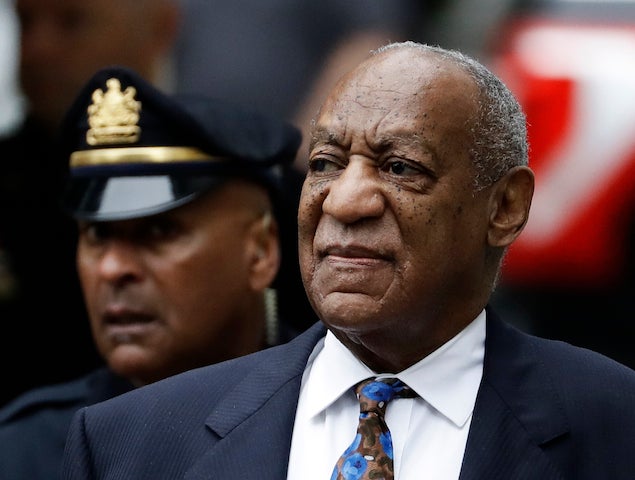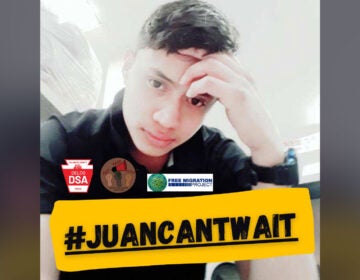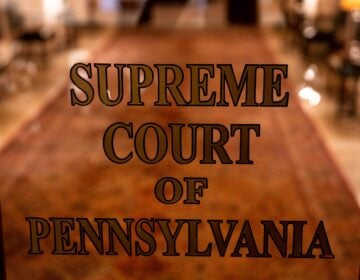Cosby’s appeal to Pa. Supreme Court hinges on inclusion of testimony from other accusers
Bill Cosby’s 2018 conviction for aggravated indecent assault came before the Pa. Supreme Court on Tuesday, in a last-ditch effort to overturn his 3-10 year prison sentence.

Bill Cosby arrives for his sentencing hearing at the Montgomery County Courthouse, Monday, Sept. 24, 2018, in Norristown, Pa. (AP Photo/Matt Slocum)
Bill Cosby’s 2018 conviction for aggravated indecent assault came before the Pennsylvania Supreme Court on Tuesday, in a last ditch effort to overturn his 3-10 year prison sentence.
At the heart of his appeal is whether his guilty verdict for drugging and sexually assaulting Andrea Constand in his Montgomery County home in 2004 relied too much on evidence not directly related to that accusation.
The Supreme Court justices only agreed to hear arguments on two legal questions. The first is whether five other women who also accused Cosby of giving them drugs and inappropriately touching or sexually assaulting them should have testified at trial. The second is whether the incriminating statements Cosby made during a deposition should have been included as evidence.
“A defendant must be tried for what he did, not who he is,” argued Cosby’s attorney Jennifer Bonjean, who said the prosecution’s approach leaned too much on accusations in the media and not on the facts of this case.
Dozens of women have come forward with accusations against the famous Philadelphia-born comedian, and their accounts have been widely covered in the press, but only Constand’s case led to criminal prosecution. Many came to light decades after the alleged assaults occurred, and were barred from the trial due to statute-of-limitations laws.
Montgomery County Assistant District Attorney Adrienne Jappe responded that such evidence is “a staple” in criminal prosecutions and is relevant to show that Cosby did not make a mistake and that he had a “common plan, scheme, or design.” The prosecution argues the added testimony is valid because these reasons for inclusion are spelled out in Pennsylvania statute 404 (b), which governs the use of such “prior bad act” witnesses.
The defense says the different outcomes in Cosby’s two criminal prosecutions show just how biasing the information was.
During Cosby’s first trial in 2017, Judge Steven T. O’Neill allowed only one other accuser to testify after the District Attorney requested 13. That prosecution ended in a mistrial when the jury failed to reach a unanimous decision.
During a retrial the following year, the prosecution asked to allow 19 women to testify, and that time O’Neill allowed five.
On Tuesday, Pa. Supreme Court justices repeatedly questioned whether the Montgomery County District Attorney’s Office needed those witnesses to prosecute the case or whether the sheer volume of accusers was unfair. Since the trial only centered on Constand’s accusations, they raised concerns that the other women, whose claims are not on trial, could have biased the jury.
“I tend to agree that this evidence was extraordinarily prejudicial to [Cosby],” said Justice Max Baer, while also allowing that trial judges have wide latitude to make calls about what evidence to admit.
As to whether these five women all experienced nearly identical treatment, so as to constitute a signature crime, Justice Christine Donahue said, “Frankly, I don’t see it.”
The court also heard arguments about a deposition that Cosby gave as a part of a civil trial, during which he talked about giving women quaaludes before sex.
Bonjean, Cosby’s lawyer, argued that Cosby was lulled into incriminating himself because he had been promised by former Montgomery County District Attorney Bruce Castor that he would not be prosecuted if he took part in a civil case.
The justices questioned why someone of Cosby’s resources would not have invoked his Fifth Amendment right not to incriminate himself during that proceeding.
“We’re dealing with an individual who is knowledgeable of the legal system,” said Justice Kevin Dougherty.
For that, Bonjean blamed Cosby’s previous legal counsel.
“High-profile people rely, almost to their detriment, on legal advice,” she said.
The terms of that promise, which was not written down in a formal agreement but instead shared in a press release, indicate that Cosby was never offered total immunity, said Deputy District Attorney Bob Falin.
He argued that the press release itself, issued by former Montgomery County District Attorney Bruce Castor, left open the possibility of a future trial. Falin also said that because Cosby declined to answer many questions about Constand, he was not acting as though he thought he had total immunity.
Falin argued that by sitting for the deposition, Cosby was simply “trying to avoid negative consequences for invoking the Fifth,” namely the perception that Cosby would look guilty in the eyes of the jury.
After the hearing, Cosby, 83, released a statement through a spokesperson praising his attorney and saying, “I’m so happy because I hope and truly believe that justice will prevail.”
The Pennsylvania Supreme Court may take a couple of months to issue a ruling. For the past two years Cosby has been incarcerated at SCI-Phoenix in Skippack Township, Montgomery County.

Get daily updates from WHYY News!
WHYY is your source for fact-based, in-depth journalism and information. As a nonprofit organization, we rely on financial support from readers like you. Please give today.





